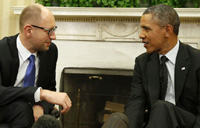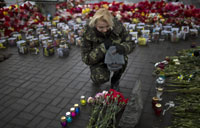WASHINGTON - The United States on Wednesday continued to move toward heightening pressure on Russia over the crisis in Ukraine, but it remains unknown whether Washington's actions will have any impact, experts said.
|

 Ukraine crisis |
US President Barack Obama on Wednesday hosted Ukrainian interim Prime Minister Arseniy Yatsenyuk at the White House, while the Senate Foreign Relations Committee voted to impose financial sanctions and visa restrictions on Russian officials.
With a referendum over whether Ukraine's autonomous republic of Crimea will become part of Russia planned for Sunday, Washington has been ratcheting up pressure on Moscow. Earlier this week, the White House indicated that Moscow would be booted out of the Group of Eight (G8) Industrialized Nations.
The US has blasted Russia for deploying its armed forces to Crimea in recent weeks, although Russian President Vladimir Putin said his aim was simply to protect that region's massive ethnic Russian population and last week dismissed assumptions that Moscow is considering Crimea's accession to Russia -- adding that only Crimeans themselves may determine their future.
He also warned that any harm from sanctions would be "mutual in the modern world," saying Russia would continue to prepare for June's G8 summit.
With Moscow's deep ties to the global economy, US sanctions could hurt Russia, but the impact remains unknown, US experts said.
"Russia certainly is tied to the global economy. This puts it in a very different position to the old Soviet Union. But President Putin has shown a willingness to pay a short-term economic penalty in order to advance his geopolitical interests," David Clark, chairman of the Russia Foundation, told Xinhua.
"The question is whether the economic price can be raised to the point where the internal political stability of Russia is called into doubt," he added.
Russia could be vulnerable to a financial crisis or a sustained drop in energy prices, either of which could force him to cut social transfers needed to govern with domestic consent, Clark said.
Measures aimed at the Russian banking system and the stability of the ruble could have an immediate impact on Russia's economic interests. In the longer term, Russia's need for inward investment and new technology means the country is vulnerable to restrictions on capital flows and technology transfer, he said.
The US could also damage Russian interests by making more gas available for export as liquefied natural gas, reducing European prices and dependency on the Russian oil giant Gazprom. Travel bans and assets freezes aimed at specific members of the Russian elite would also hurt Russia, he said.
Russia currently supplies around a quarter of Europe's oil and natural gas, not to mention 40 percent of economic powerhouse Germany's gas, and Moscow has a deep trade relationship with Eurozone nations, which some experts said could make Europe hesitatant to impose sanctions.
Russia sends nearly $300 billion worth of exports to EU countries, which account for nearly half of Russia's total exports, whereas Russia is only the 20th largest trading partner for the US.
US Republican strategist Ford O'Connell said Russia "is not an easy country to squeeze" diplomatically and economically.
"Whatever game plan or sanctions the US does, (US Secretary of State John) Kerry is going to have to get all these folks on board in Europe," he told Xinhua.
Former US Defense Secretary Robert Gates said he believed that US sanctions would not have an impact on Russia.